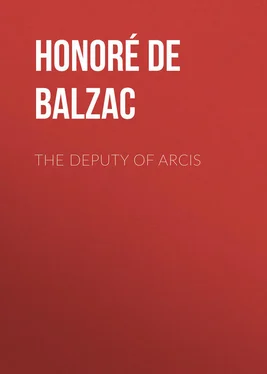Honoré Balzac - The Deputy of Arcis
Здесь есть возможность читать онлайн «Honoré Balzac - The Deputy of Arcis» — ознакомительный отрывок электронной книги совершенно бесплатно, а после прочтения отрывка купить полную версию. В некоторых случаях можно слушать аудио, скачать через торрент в формате fb2 и присутствует краткое содержание. Жанр: literature_19, foreign_antique, foreign_prose, на английском языке. Описание произведения, (предисловие) а так же отзывы посетителей доступны на портале библиотеки ЛибКат.
- Название:The Deputy of Arcis
- Автор:
- Жанр:
- Год:неизвестен
- ISBN:нет данных
- Рейтинг книги:3 / 5. Голосов: 1
-
Избранное:Добавить в избранное
- Отзывы:
-
Ваша оценка:
- 60
- 1
- 2
- 3
- 4
- 5
The Deputy of Arcis: краткое содержание, описание и аннотация
Предлагаем к чтению аннотацию, описание, краткое содержание или предисловие (зависит от того, что написал сам автор книги «The Deputy of Arcis»). Если вы не нашли необходимую информацию о книге — напишите в комментариях, мы постараемся отыскать её.
The Deputy of Arcis — читать онлайн ознакомительный отрывок
Ниже представлен текст книги, разбитый по страницам. Система сохранения места последней прочитанной страницы, позволяет с удобством читать онлайн бесплатно книгу «The Deputy of Arcis», без необходимости каждый раз заново искать на чём Вы остановились. Поставьте закладку, и сможете в любой момент перейти на страницу, на которой закончили чтение.
Интервал:
Закладка:
“Cecile, who told you to dress yourself in that way?” she demanded.
“Are we not going to-night to Madame Marion’s? I dressed myself now to see if my new gown fitted me.”
“Cecile! Cecile!” exclaimed Severine, “why do you try to deceive your mother? It is not right; and I am not pleased with you – you are hiding something from me.”
“What has she done?” asked Beauvisage, delighted to see his daughter so prettily dressed.
“What has she done? I shall tell her,” said Madame Beauvisage, shaking her finger at her only child.
Cecile flung herself on her mother’s neck, kissing and coaxing her, which is a means by which only daughters get their own way.
Cecile Beauvisage, a girl of nineteen, had put on a gown of gray silk trimmed with gimp and tassels of a deeper shade of gray, making the front of the gown look like a pelisse. The corsage, ornamented with buttons and caps to the sleeves, ended in a point in front, and was laced up behind like a corset. This species of corset defined the back, the hips, and the bust perfectly. The skirt, trimmed with three rows of fringe, fell in charming folds, showing by its cut and its make the hand of a Parisian dressmaker. A pretty fichu edged with lace covered her shoulders; around her throat was a pink silk neckerchief, charmingly tied, and on her head was a straw hat ornamented with one moss rose. Her hands were covered with black silk mittens, and her feet were in bronze kid boots. This gala air, which gave her somewhat the appearance of the pictures in a fashion-book, delighted her father.
Cecile was well made, of medium height, and perfectly well-proportioned. She had braided her chestnut hair, according to the fashion of 1839, in two thick plaits which followed the line of the face and were fastened by their ends to the back of her head. Her face, a fine oval, and beaming with health, was remarkable for an aristocratic air which she certainly did not derive from either her father or her mother. Her eyes, of a light brown, were totally devoid of that gentle, calm, and almost timid expression natural to the eyes of young girls. Lively, animated, and always well in health, Cecile spoiled, by a sort of bourgeois matter-of-factness, and the manners of a petted child, all that her person presented of romantic charm. Still, a husband capable of reforming her education and effacing the traces of provincial life, might still evolve from that living block a charming woman of the world.
Madame Beauvisage had had the courage to bring up her daughter to good principles; she had made herself employ a false severity which enabled her to compel obedience and repress the little evil that existed in the girl’s soul. Mother and daughter had never been parted; thus Cecile had, what is more rare in young girls than is generally supposed, a purity of thought, a freshness of heart, and a naivete of nature, real, complete, and flawless.
“Your dress is enough to make me reflect,” said Madame Beauvisage. “Did Simon Giguet say anything to you yesterday that you are hiding from me?”
“Dear mamma,” said Cecile in her mother’s ear, “he bores me; but there is no one else for me in Arcis.”
“You judge him rightly; but wait till your grandfather has given an opinion,” said Madame Beauvisage, kissing her daughter, whose reply proved her good-sense, though it also revealed the breach made in her innocence by the idea of marriage.
Severine was devoted to her father; she and her daughter allowed no one but themselves to take charge of his linen; they knitted his socks for him, and gave the most minute care to his comfort. Grevin knew that no thought of self-interest had entered their affection; the million they would probably inherit could not dry their tears at his death; old men are very sensible to disinterested tenderness. Every morning before going to see him, Madame Beauvisage and Cecile attended to his dinner for the next day, sending him the best that the market afforded.
Madame Beauvisage had always desired that her father would present her at the Chateau de Gondreville and connect her with the count’s daughters; but the wise old man explained, again and again, how difficult it would be to have permanent relations with the Duchesse de Carigliano, who lived in Paris and seldom came to Gondreville, or with the brilliant Madame Keller, after doing a business in hosiery.
“Your life is lived,” he said to his daughter; “find all your enjoyments henceforth in Cecile, who will certainly be rich enough to give you an existence as broad and high as you deserve. Choose a son-in-law with ambition and means, and you can follow her to Paris and leave that jackass Beauvisage behind you. If I live long enough to see Cecile’s husband I’ll pilot you all on the sea of political interests, as I once piloted others, and you will reach a position equal to that of the Kellers.”
These few words were said before the revolution of July, 1830. Grevin desired to live that he might get under way the future grandeur of his daughter, his grand-daughter, and his great-grandchildren. His ambition extended to the third generation.
When he talked thus, the old man’s idea was to marry Cecile to Charles Keller; he was now grieving over that lost hope, uncertain where to look in the future. Having no relations with Parisian society, and seeing in the department of the Aube no other husband for Cecile than the youthful Marquis de Cinq-Cygne, he was asking himself whether by the power of gold he could surmount the animosities which the revolution of July had roused between the royalists who were faithful to their principles, and their conquerors. The happiness of his grand-daughter seemed to him so doubtful if he delivered her into the hands of the proud and haughty Marquise de Cinq-Cygne that he decided in his own mind to trust to the friend of old age, Time. He hoped that his bitter enemy the marquise might die, and, in that case, he thought he could win the son through his grandfather, old d’Hauteserre, who was then living at Cinq-Cygne and whom he knew to be accessible to the persuasions of money.
If this plan failed, and Cecile Beauvisage remained unmarried, he resolved as a last resort to consult his friend Gondreville, who would, he believed, find his Cecile a husband, after his heart and his ambition, among the dukes of the Empire.
IX. A STRANGER
Severine found her father seated on a wooden bench at the end of his terrace, under a bower of lilacs then in bloom, and taking his coffee; for it was half-past five in the afternoon. She saw, by the pain on her father’s face, that he had already heard the news. In fact, the old count had sent a valet to his friend, begging him to come to him.
Up to the present time, old Grevin had endeavored not to encourage his daughter’s ambition too far; but now, in the midst of the contradictory reflections which the melancholy death of Charles Keller caused him, his secret escaped his lips.
“My dear child,” he said to her, “I had formed the finest plans for your future. Cecile was to have been Vicomtesse Keller, for Charles, by my influence, would now have been selected deputy. Neither Gondreville nor his daughter Madame Keller would have refused Cecile’s dot of sixty thousand francs a year, especially with the prospect of a hundred thousand more which she will some day have from you. You would have lived in Paris with your daughter, and played your part of mother-in-law in the upper regions of power.”
Madame Beauvisage made a sign of satisfaction.
“But we are knocked down by the death of this charming young man, to whom the prince royal had already given his friendship. Now this Simon Giguet, who has thrust himself upon the scene, is a fool, and the worst of all fools, for he thinks himself an eagle. You are, however, too intimate with the Giguets and the Marion household not to put the utmost politeness into your refusal – but you must refuse him.”
Читать дальшеИнтервал:
Закладка:
Похожие книги на «The Deputy of Arcis»
Представляем Вашему вниманию похожие книги на «The Deputy of Arcis» списком для выбора. Мы отобрали схожую по названию и смыслу литературу в надежде предоставить читателям больше вариантов отыскать новые, интересные, ещё непрочитанные произведения.
Обсуждение, отзывы о книге «The Deputy of Arcis» и просто собственные мнения читателей. Оставьте ваши комментарии, напишите, что Вы думаете о произведении, его смысле или главных героях. Укажите что конкретно понравилось, а что нет, и почему Вы так считаете.












